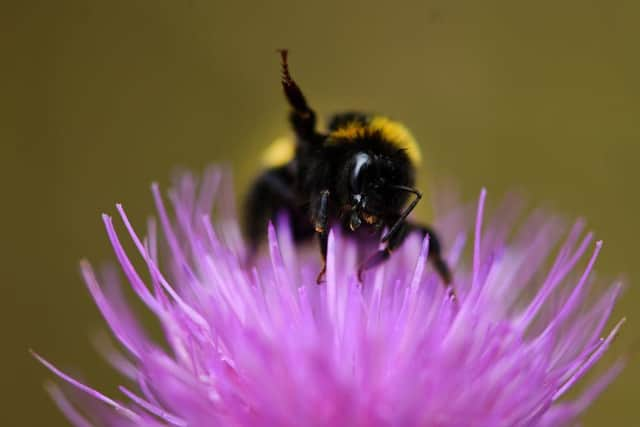World Bee Day 2021: when is the international celebration of bees, what is the theme – and UK activities
and live on Freeview channel 276
World Bee Day 2021 is upon us, with the aim to shine a light on the importance that bees play in all of our lives, whether we realise it or not.
This is everything you need to know.
What is World Bee Day - and when is it?


World Bee Day is an annual event that takes place on 20 May every year, and aims to highlight the importance of the role that bees, and other pollinators, play in the world.
Advertisement
Hide AdAdvertisement
Hide AdWhile it is called World Bee Day, the day is not just dedicated to bees, but all kinds of pollinators, including species of butterflies, moths, wasps, beetles, birds and bats.
In 2017, the United Nations declared 20 May as World Bee Day, and that every year on this day, attention around the world would be directed at the importance of preserving bees, and other pollinators. The day has since been celebrated from 2018.
The day was proposed by Slovenia, in response to an initiative from the Slovenian Beekeepers’ Association.
The resolution was co-sponsored by 115 UN Member States, including the USA, Canada, China, the Russian Federation, India, Brazil, Argentina, Australia and all the European Union Member States.
Advertisement
Hide AdAdvertisement
Hide AdThis year, the theme of World Bee Day is “Bee engaged - Build Back Better for Bees”.
What events are taking place?
Due to the ongoing Covid-19 pandemic, the Food and Agriculture Organization of the United Nations (FAO) has organised a virtual event for World Bee Day 2021.
The FAO says: “The event will call for global cooperation and solidarity to counter the threats posed by the Covid-19 pandemic to food security and agricultural livelihoods alongside prioritising environmental regeneration and pollinator protection.
“It will be an occasion to raise awareness of how everyone can make a difference to support, restore and enhance the role of pollinators.”
Advertisement
Hide AdAdvertisement
Hide AdThe event will be formally opened by the FAO Director-General QU Dongyu, and will focus on the vital role that bees and other pollinators play.
You can register for the event via the FAO website and selecting the Zoom option. You’ll need to fill out some information, like your name, email address and country you’re tuning in from.
The event will take place at 12pm UK time.
Those taking part in World Bee Day are also encouraged to follow the conversations on social media, using the hashtags #WorldBeeDay and #SaveTheBees.
Why are bees important?
The world would be in serious trouble if bees were to go extinct - and unfortunately, a world without the fuzzy pollinators is becoming more of a possibility.
Advertisement
Hide AdAdvertisement
Hide AdBees, and other pollinators, are responsible for nearly three quarters of the plants that produce 90 per cent of the world’s food, meaning a third of the world’s food production depends on bees.
While there are other methods of pollination, such as by the wind and other animals, wild bees are among the most important pollinators because they are able to pollinate on a much larger scale, according to the Woodland Trust.
The Woodland Trust says: “It has been estimated that it would cost farmers in the UK an incredible £1.8 billion per year to manually pollinate their crops, which just further emphasises the importance of bees.”
Carla Mucavi, Director of the FAO Liaison Office in New York, says: “Bees play a crucial role in increasing crop yields and promoting food security and nutrition.
Advertisement
Hide AdAdvertisement
Hide Ad“Without them, we could lose a variety of food such as potatoes, pepper, coffee, pumpkins, carrots, apples, almonds, tomatoes, just to name a few. In short, without bees, FAO cannot achieve a world without hunger.
“World Bee Day recognizes the importance of these tiny helpers and will increase awareness of the need to protect them.”
What activities can I do to help the bees?
The number of bees around the world are sadly declining on a global scale, thanks to a number of factors including the use of toxic pesticides, loss of habitats and climate change.
There are a number of ways that you can help your local population of bees - the World Wide Fund for Nature (WWF) offers the following advice:
Advertisement
Hide AdAdvertisement
Hide Ad- Make your garden bee friendly by growing a range of flowers so that bees have access to nectar from March to October. Bees love traditional cottage garden flowers and native wildflowers, such as primrose, buddleia and marigolds
- Build, or buy, an “insect hotel” which provides a sheltered home for bees and other insects
- Revive a tired bee with some sugar water - mix two teaspoons of white granulated sugar with one teaspoon of water and place it on a plate, or drip it on a flower, to give a bee a boost
- Buy sustainable honey - when done right, bee farming can be very beneficial for wild bee populations. When choosing your honey, try to go for something local, from individual beekeepers who practice sustainability. Additionally, you should try eating honey less often
